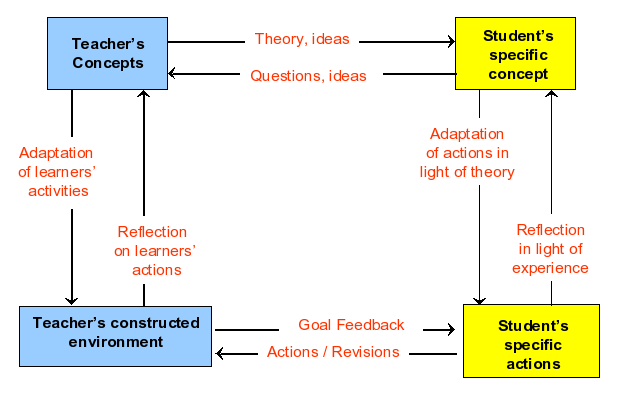Laurillard conversational framework: Difference between revisions
(using an external editor) |
m (using an external editor) |
||
| Line 1: | Line 1: | ||
{{ | {{Stub}} | ||
== Definition == | == Definition == | ||
| Line 5: | Line 5: | ||
Laurillard (1993,2002) claims that there are four main aspects of the teaching-learning process and that different educational media can be analyzed (and used) in terms of these dimensions. | Laurillard (1993,2002) claims that there are four main aspects of the teaching-learning process and that different educational media can be analyzed (and used) in terms of these dimensions. | ||
This framework can be considered both [[learning theory]] and a practical framework for designing educational environments. Higher education, according to Laurrillard is much about acquiring "ways of seeing the world". Associated [[pedagogic strategy]] has to consider different forms of communication: Discussion, adaptation, interaction, reflection. | This framework can be considered both [[learning theory]] and a practical framework for designing educational environments. Higher education, according to Laurrillard is much about acquiring "ways of seeing the world". Associated [[pedagogic strategy]] has to consider different forms of communication and associated mental activities: Discussion, adaptation, interaction, reflection. | ||
== Design of learning environments == | == Design of learning environments == | ||
Laurillards framework includes for important components: | |||
* Teacher's concepts | |||
* Teacher's constructed learning environment | |||
* Student's concepts | |||
* Student's specific actions (related to learning tasks). | |||
[[Image:laurillard-conversational-framework.png|frame|none|Laurillard's Conversational framework]] | [[Image:laurillard-conversational-framework.png|frame|none|Laurillard's Conversational framework]] | ||
Each (larger) pedagogical scenario should include all four kinds of activities (communication forms) that happend in 8 kinds of "flows" in the model. | |||
;(1) Discussion | |||
;(1) Discussion | |||
* Teachers' and learners' conception should be mututally accessible | * Teachers' and learners' conception should be mututally accessible | ||
* Both should agree on learning objectives | * Both should agree on learning objectives | ||
| Line 27: | Line 32: | ||
* Learners should reflect with all stages of the learning process (initial concepts, tasks, objectives, feedback, ...) | * Learners should reflect with all stages of the learning process (initial concepts, tasks, objectives, feedback, ...) | ||
== Media and activities | == Media and activities == | ||
{{comment | to be written, show that different media-supported scenarios are different and maybe that different media have different affordances}} | |||
== Links == | == Links == | ||
| Line 38: | Line 45: | ||
* [http://www.glow.ac.uk/resources/part1/wbl10.htm#conversational Diana Laurillard's conversational model] Part of a [http://www.glow.ac.uk/resources/contents.htm GLOW] text on What educational theories apply to web-based learning? | * [http://www.glow.ac.uk/resources/part1/wbl10.htm#conversational Diana Laurillard's conversational model] Part of a [http://www.glow.ac.uk/resources/contents.htm GLOW] text on What educational theories apply to web-based learning? | ||
== References == | == References == | ||
* Atherton J S (2005) Learning and Teaching: Conversational learning theory; Pask and Laurillard [On-line] UK: Available: http://www.learningandteaching.info/learning/pask.htm Accessed: 12 September 2006 | * Atherton J S (2005) Learning and Teaching: Conversational learning theory; Pask and Laurillard [On-line] UK: Available: http://www.learningandteaching.info/learning/pask.htm Accessed: 12 September 2006 | ||
Revision as of 11:45, 12 September 2006
Definition
Laurillard (1993,2002) claims that there are four main aspects of the teaching-learning process and that different educational media can be analyzed (and used) in terms of these dimensions.
This framework can be considered both learning theory and a practical framework for designing educational environments. Higher education, according to Laurrillard is much about acquiring "ways of seeing the world". Associated pedagogic strategy has to consider different forms of communication and associated mental activities: Discussion, adaptation, interaction, reflection.
Design of learning environments
Laurillards framework includes for important components:
- Teacher's concepts
- Teacher's constructed learning environment
- Student's concepts
- Student's specific actions (related to learning tasks).
Each (larger) pedagogical scenario should include all four kinds of activities (communication forms) that happend in 8 kinds of "flows" in the model.
- (1) Discussion
- Teachers' and learners' conception should be mututally accessible
- Both should agree on learning objectives
- (2) Adaptation
- Teacher must adapt objectives with regards to existing conceptions
- Learners must integrate feedback and link it to his own conceptions
- (3) Interaction
- Teacher must "adapt to world", i.e. create an environment adapted to the learning task given to the learner
- Teacher must focus on support for task and give appropriate feedback to the learner.
- (4) Reflection
- Teacher should support the learner to revise his conceptions and to adapt the task to learning needs
- Learners should reflect with all stages of the learning process (initial concepts, tasks, objectives, feedback, ...)
Media and activities
- to be written, show that different media-supported scenarios are different and maybe that different media have different affordances
Links
- A conversational framework for Instruction (nice chart)
- Diana Laurillard's conversational model Part of a GLOW text on What educational theories apply to web-based learning?
References
- Atherton J S (2005) Learning and Teaching: Conversational learning theory; Pask and Laurillard [On-line] UK: Available: http://www.learningandteaching.info/learning/pask.htm Accessed: 12 September 2006
- Laurillard, D. M. (1993). Rethinking University Teaching: A Framework for the Effective Use of Educational Technology. Routledge, London.
- Laurillard, D. (2002). Rethinking University Teaching. A conversational framework for the effective use of learning technologies. London: Routledge
